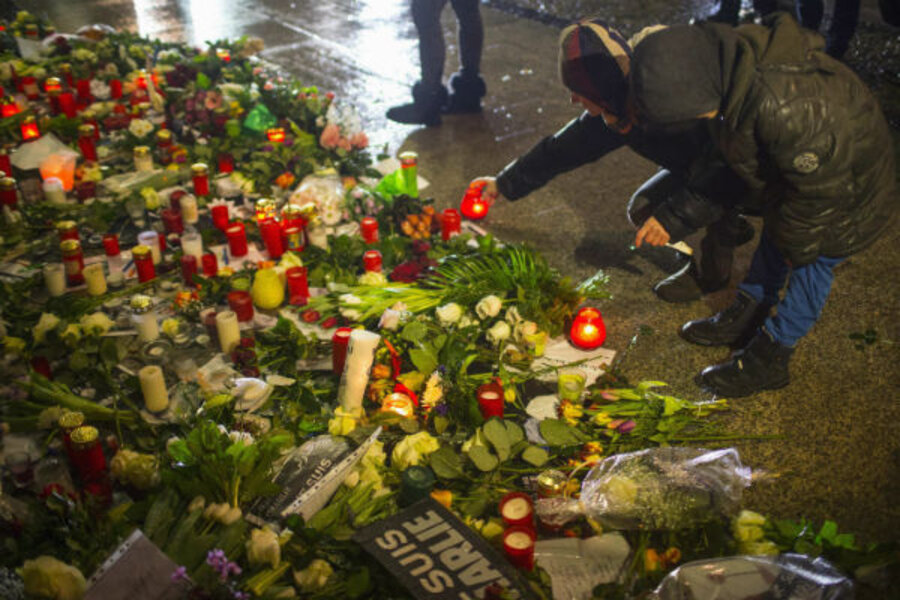Charlie Hebdo: Avoid anxiety by association
Loading...
Parents who are trying to absorb news of violence, from the terror attack in Paris at Charlie Hebdo, to other violence abroad and in America, may want to pause to consider how their reactions can inadvertently pass on their anxieties to their children through what they say.
“Parents don’t need to spread their anxieties to their kids,” said Jamie Howard, a child psychologist at the Child Mind Institute of Manhattan, New York City in a phone interview. Dr. Howard specializes in teens and children of all ages struggling with Post Traumatic Stress Disorder (PTSD).
That’s why parents need to be extra careful when news tries to shock us into reacting, perhaps in the form of a rant. From US news of police violence and protests and cybersecurity attacks from North Korea, to the news of gunmen attacks on the French satirical newspaper Charlie Hebdo, there is plenty of news clamoring for a response.
However, we don’t need to create a toxic environment for our own kids to absorb the news by venting our fears, anxieties, and perhaps anger.
Howard recommends that parents of very young children make no mention of any negative news items in the presence of children and only speak about them if and when the child brings it up for question.
“Then you only answer the questions they ask,” she said. “Don’t add or expand on the topic or talk about how you feel about it. Be matter-of-fact.”
For pre-teens and older, Howard offers a slightly different approach.
“Again, you want to be very matter-of-fact,” Howard said. “With kids over age 10 you have to realize they are always monitoring adult conversations and taking cues, even when you’re sure they’re not listening they usually are. They’re really tuned-in to you for their social and emotional cues.”
I asked Howard what she recommends a parent do if they have reacted vocally to the news and found that a child was within earshot.
“Rants scare kids because they think their parent is out of control,” Howard explained. “Tell the child of any age that action doesn’t always follow emotion. Tell them you were just angry in that moment or scared in that moment and that while people get caught-up in emotions they don’t have to act on them. Basically, let them know it’s out of your system.”
Last night my son Quin, 11, heard his brothers and me discussing the news about the terror attack on Charlie Hebdo. I hadn’t realized he was in the adjoining room.
He wasn’t immediately worried by our discussion, and didn’t ask any questions, although I asked him if he’d heard our conversations and if he had any concerns.
He seemed to reason that even though my husband works for a large newspaper that runs political cartoons, the incident took place in another country so there was nothing to fear.
Unfortunately, Quin is also a kid who does follow-up and this morning, just to reassure himself before school, he rifled through the newspaper looking to see if it had run any cartoons that terrorists might find offensive.
My husband had told me there would be a political cartoon, but I wasn’t monitoring Quin because I assumed he’d forgotten all about it.
I heard Quin triumphantly announce that “The funnies section is all clear!”
Then I was running in to try and snatch away the OpEd section – too late.
There was a reprint of the inflammatory cartoon from Charlie Hebdo that sparked the violence against Charlie Hebdo with the headline: “After Paris We Are All Charlie.”
Beside the cartoon were the handwritten words, “The artist who drew this cartoon died. The cartoon didn’t. Don’t let it.”
“O.K, that’s a dumb idea,” Quin said in exasperation as he shook the page at me. “Do I need to worry about Pop now?”
My very decisive, hopefully reassuring response was, “Nope! No way. Not happening.”
I adopted the same response as my mother right after the Sept. 11, 2001 attacks, when we lived in New Jersey and my older sons, ages seven and eight at the time, were asking if I was afraid terrorists were going to strike again.
My mom leapt in saying, “Nope! No way Jose! It’s allllll over. Let’s go have a cookie.”
Now, Quin looked hard at me to see if I was being truthful.
“Seriously,” he asked, giving me a very flinty look.
“Totally,” I said, shifting the subject. “Poptart?”
Because I was sure, Quin became more sure, going into his typical logic mode.
“Well, we’re not in France,” he reasoned. “Plus, the newspaper here is like a maze. The terrorists would never find Papa. Plus the parking downtown is terrible. They’d have to park like blocks away and walk and people would notice terrorists walking and get them before they even got to the place.”
Just as fast as he had been in full-blown crisis mode, Quin was away from the newspaper.
In my experience, kids bounce back fast as long as we don’t weigh them down with our fears – and they move forward fast when we get out of their way. While we need to talk to our kids about what is happening in the world, it’s important to be sure we are filling their needs for information, reassurance, and understanding more than our need to vent.






